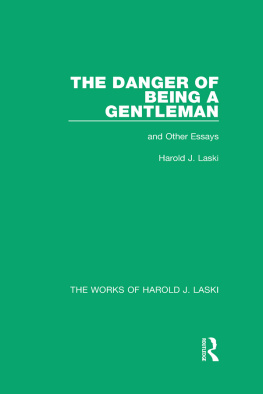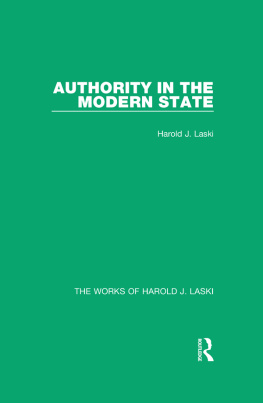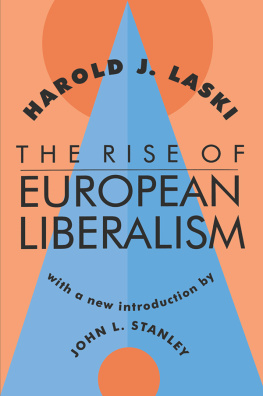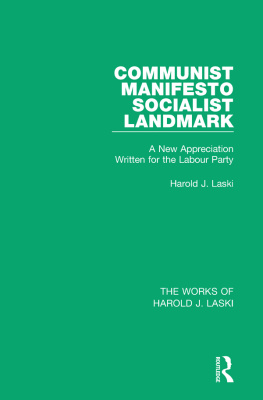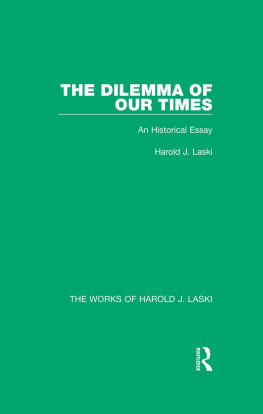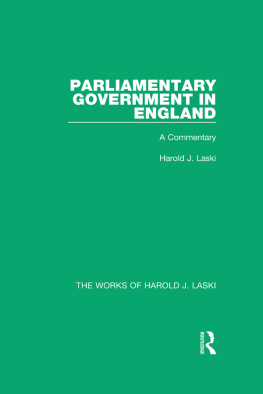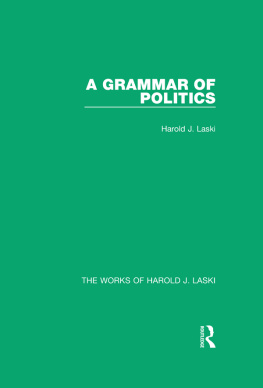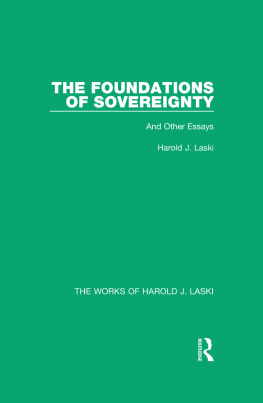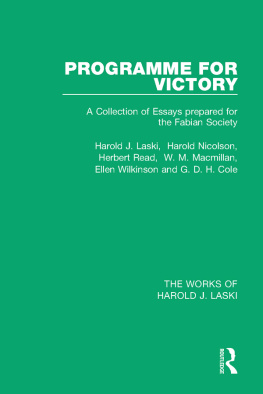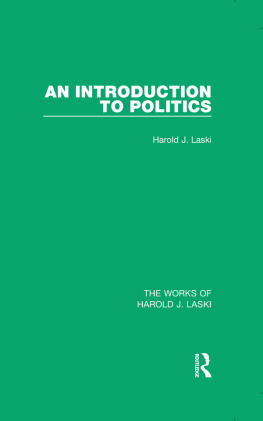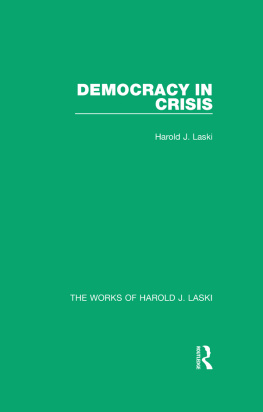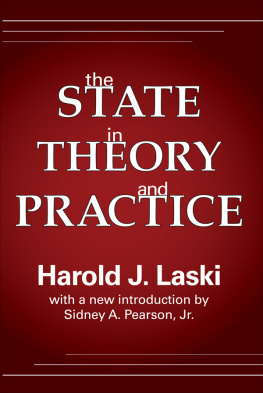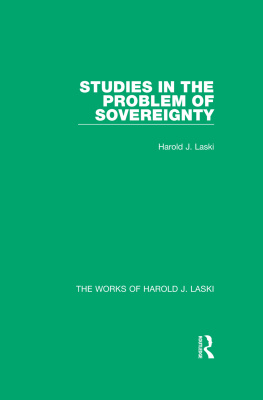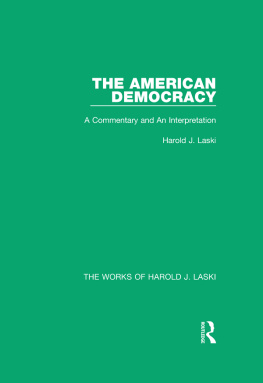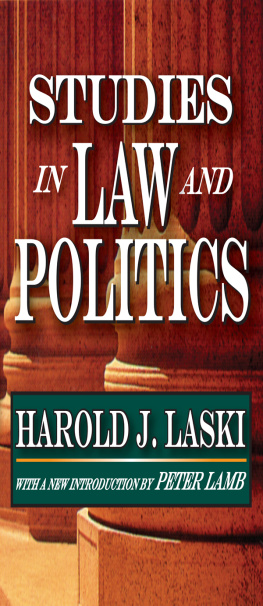THE WORKS OF HAROLD J. LASKI
Volume 10
THE DANGER OF BEING A GENTLEMAN
THE DANGER OF BEING A GENTLEMAN
and Other Essays
HAROLD J. LASKI
First published in 1939 by George Allen & Unwin Ltd
This edition first published in 2015
by Routledge
2 Park Square, Milton Park, Abingdon, Oxon OX14 4RN
by Routledge
711 Third Avenue, New York, NY 10017
Routledge is an imprint of the Taylor & Francis Group, an informa business
1939 George Allen & Unwin Ltd
All rights reserved. No part of this book may be reprinted or reproduced or utilised in any form or by any electronic, mechanical, or other means, now known or hereafter invented, including photocopying and recording, or in any information storage or retrieval system, without permission in writing from the publishers.
Trademark notice: Product or corporate names may be trademarks or registered trademarks, and are used only for identification and explanation without intent to infringe.
British Library Cataloguing in Publication Data
A catalogue record for this book is available from the British Library
ISBN: 978-1-138-81912-2 (Set)
eISBN: 978-1-315-74273-1 (Set)
ISBN: 978-1-138-82211-5 (Volume 10)
eISBN: 978-1-315-74259-5 (Volume 10)
Publishers Note
The publisher has gone to great lengths to ensure the quality of this reprint but points out that some imperfections in the original copies may be apparent.
Disclaimer
The publisher has made every effort to trace copyright holders and would welcome correspondence from those they have been unable to trace.
THE DANGER OF BEING A GENTLEMAN
and Other Essays
by
HAROLD J. LASKI
FIRST PUBLISHED IN COLLECTED FORM IN 1939
ALL RIGHTS RESERVED
PRINTED IN CREAT BRITAIN
in II-Point Baskerville Type
BY UNWIN BROTHERS LIMITED
WOKING
To
HUGO AND JOSEPHINE BLACK
I CANNOT, I fear, claim that this book has any greater unity of theme than the fact that most of its essays deal with subjects it is my professional duty to study. I have ventured to reprint them mainly because most of them are now unobtainable, and some of them are still asked for by students and friends.
I have to thank Messrs. Harper and Brothers for permission to reprint Essays I and VIII; The Oxford University Press and Sir Humphrey Milford for permission to reprint Essay II; Essays IV and V originally appeared in Politica, and are reprinted here by leave of the London School of Economics and Political Science; the Hogarth Press kindly allowed me to include Essay III, and the Conway Memorial Trustees and Messrs. Watts, Essay VII. Essay VI originally appeared in a Century of Local Government (1935) and is here reprinted by permission of Messrs. George Allen & Unwin.
H.J.L.
LITTLE BARDFIELD
ESSEX
I
I T is the boast of England that the idea of being a gentleman is peculiar to her people, and I think there is solid substance in the boast. As an ideal, it has at least the supreme merit of simplicity. The gentleman is, rather than does; he maintains towards life an attitude of indifferent receptivity. He is interested in nothing in a professional way. He is allowed to cultivate hobbies, even eccentricities, but he must not practise a vocation. He must not concern himself with the sordid business of earning his living; and he must be able to show that, at least back to his grandfather, none of his near relations has ever been engaged in trade. It is desirable that he should have attended one of a limited number of schools, preferably Eton or Harrow; and it is practically essential that he should have been to Oxford or Cambridge. He must know how to ride and shoot and cast a fly. He should have relatives in the army and navy, and at least one connection in the diplomatic service. It is vital that he should belong to a club, urgent that he be a member of the Conservative Party, and desirable that his ideas should coincide with those of the Morning Post. An ability to endure the Riviera in the winter, and to make the round of English country houses from August to November is a valuable, though not an integral, part of his equipment.
These may be termed the foundations upon which the ultimate superstructure is raised. But there are certain emotional and intellectual penumbrae which should not go unemphasized. His favourite authors should be Surtees and Kipling. He should deprecate the moral elasticity of modern fiction. He should feel the fine sanity of Gilbert and Sullivan while he is alien to any profound concern about Beethoven or Mozart. He should know how to arrive late at the opera, and his feeling about the theatre should be that a man wants to be amused there. A visit to Paris should leave him with a sense of pleasant proximity to sin, and he should be quite unable to speak intelligible French or German. He should play most games in some fashion and feel that their cultivation is the secret of national greatness; but he should play none so well that he is thereby distinguished from his fellows and he should be convinced that professionalism ruins the true spirit of sport. Under no circumstances can he be a teetotaller except upon medical grounds.
Certain other qualities are important. He should know nothing of political economy and less about how foreign countries are governed. He should equate bolshevism with original sin. While he should never be a free-thinker, he should not be enthusiastic about religion; to be so is to run the risk of obtrusiveness. He should be properly conscious of the merits of Empire and feel that only the strong hand can maintain our prestige in the East. When he dines out he must be able either not to talk at all or to confine his conversation to that plane which indicates a full knowledge of the right gossip without being an index to a dangerous profundity in any special theme. He must feel that America is passionately materialist; but if he marries an American he must take care to ally himself only with those properly endowed families who are received into the best London houses. He may be good at gardening. He may become a director of a company, provided he is not too well informed about its business. He must find speech difficult, and eloquence impossible. He must feel intensely the moral beauty of good form; and he must recognize that to wear, for instance, a black tie with a tail coat in the evening is proof (unless one is a head waiter) of a debased origin which cannot be outgrown. If, finally, he travels he must return without having suffered the deformation of a broader mind.
There are great qualities in the English gentleman which must not be overlooked. He believes with ardour in playing the game with those of his own status. He has the habit of graceful command. Save to Indians, Socialists, trade union organizers and poachers, he is almost uniformly tolerant. He is invariably courageous and, to women of his own class, chivalrous and deferential. He rarely parades his vices and he has a horror of ostentatious virtue. If he forgets to pay his tailor, he is always punctual with gambling debts. He profoundly respects the Royal Family (of whose failings he breathes no word in public), and bishops, and those Ministers of the Crown who belong to his own party. He rarely pushes a claim too far and he is too intellectually humble to take long-term views. If he grumbles much, at least he can laugh at himself; and no one is so apt to extricate himself skilfully from a dangerous situation. He enjoys the exercise of power; and since he rarely knows how to make money, it is still more rare for him to be corrupted by it. Having, in general, received a classical education, he has, like Shakespeare, as a rule, small Latin and less Greek.



